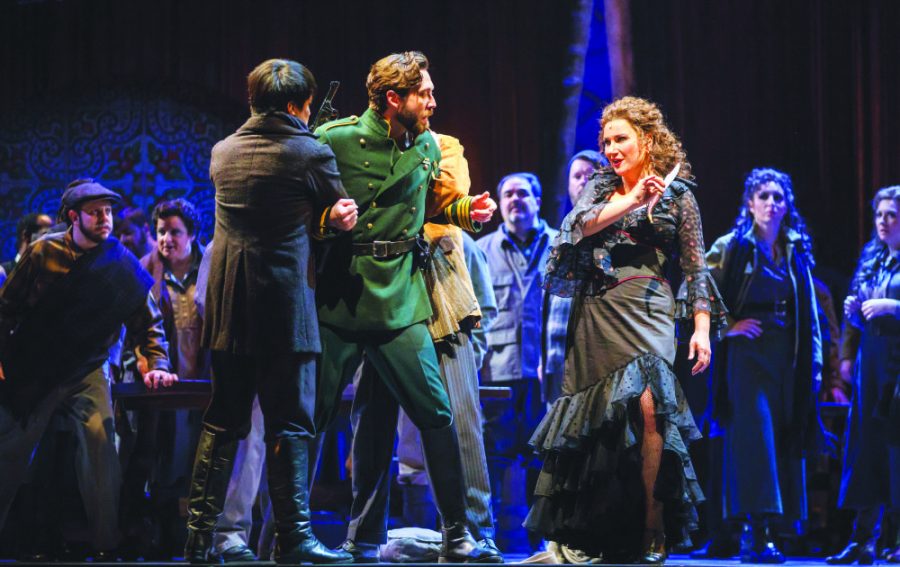‘Carmen’: A Well-Deserved Olé
2/8/17 2:28:24 PM The Lyric Opera Chicago Presents Georges Bizet Carmen Georges Bizet’s “Carmen” will be presented in the Lyric Opera of Chicago until March 25. Tickets can be purchased online at www.lyricopera.org or at the box office. © Todd Rosenberg Photograpy 2017
February 21, 2017
The Lyric Opera of Chicago turned into the thrilling and colorful Seville of the twentieth century under the spell of Georges Bizet’s musical composition for “Carmen.” A comic opera that exceptionally captures dramatic excitement and energy, “Carmen” depicts a vivid sun-soaked Andalusia and its transient, adventurous gypsy inhabitants. The opera was first performed by the Chicagoan Company in Nov. 1954, a proof of its timeless charm that keeps on engaging the public.
The opera, completely sang in French accompanied by English subtitles, revolves around the leading figure of Carmen who is a fiercely alluring character in literature, film, theater and dance. She is a uniquely beautiful, resourceful, feisty and a resolute gypsy that works at a cigarette factory. She loves to get into trouble by seducing innocent men that helplessly fall under her spell. The opera is a tale of the adventures of Carmen and her lovers (like the naïve soldier Don José that is replaced by the glamorous bullfighter Escamillo). It’s a story about a tragedy that reaches its violent culmination in a confrontation where Don José stabs and kills Carmen out of spite and heartbreak..
During the representation of the opera, the Lyric Opera faced the formidable challenge of recapturing the impact that caused the scandalous and yet successful first performances of “Carmen.” “A responsibility to the masterpiece,” in the words of Anthony Freud, the Lyric Opera’s General Director, President and CEO. The magic of Bizet’s orchestration, which conjures up a dazzling image of a sun-drenched Seville and impeccably accompanies the harmonious singing of the cast, makes it for a more than enjoyable performance delivered by both the singers and the orchestra.
I should also add that the way in which this classical opera is portrayed at the Chicagoan theatre is anything but conventional, as the element of dance plays a really important role, making it even more appealing to the public. Including not only Flamenco dancers but also matadors and even a symbolic representation of a bullfight, “Carmen” manages to integrate both music and dancing to the extent that both arts melt and compose a beautifully crafted piece that captures the audience. Another innovative factor included in the Lyric Opera’s rendition to Bizet’s “Carmen” is the introduction of spoken dialogue, which enhances the immediacy of the opera and helps to capture its theatricality. This resource also intensifies the vividness of the characters and relationships that fill up the melody.
“Carmen” is a new production created by Rob Ashford, who also directed “The Barber of Seville” in his operatic debut. “Carmen” is conducted by the music director of the Santa Fe Opera Harry Bicker, who is now branching out with triumphant success. The line-up for the night included Ekaterina Gubanova as Carmen, a Moscow native considered one of today’s most celebrated mezzo-sopranos, and Joseph Calleja as Don José, the world-renowned Maltese tenor recipient of a 2016 Opera News Award. The Chicago Children’s Choir also made a special guest appearance to support the main singers during the performance.
As a Spaniard, I was amazed that Bizet was able to produce such an accurate study of our regional culture and how certain personalities worked within its confines without ever setting foot in Spain. However, after watching the opera, I came to the realization that Carmen is just a result of artistic fascination with Spain, exotic gypsies and nomadic adventure that permeated contemporary western Europe. He was able to draw realistic, multidimensional characters out of Proper Merimeé’s 1845 novella, like Carmen, the independent bohémienne who cannot be tamed. The clothing and scenery brought me back to my beloved Spain, and Bizet’s bewitching melodies (the smoky Habanera, the playful Seguidilla or the provocative Gypsy song) made me admire even more the intensity and passion of this femme fatale’s depiction.
If you don’t want to miss out on the Lyric Opera of Chicago’s incredible Carmen, you can still get the tickets to enjoy the show until March 25.








